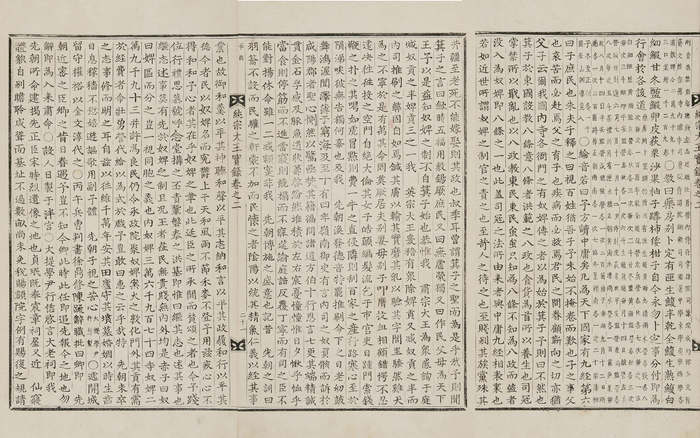"(Translation) 純祖 1年 公奴婢制 革罷 綸音"의 두 판 사이의 차이
(→Student 7 : (Write your name)) |
(→Student 10 : (Write your name)) |
||
| 99번째 줄: | 99번째 줄: | ||
| − | ==='''Student 10 : ( | + | ==='''Student 10 : (Jinsook You)'''=== |
---- | ---- | ||
| − | + | 予方讀中庸矣。 凡爲天下國家, 有九經, 第六曰: ‘子庶民也。’ 朱夫子釋之曰: ‘視百姓猶吾子,’ 予未始不掩卷而歎也。 子之事父也, 哀苦而必赴焉, 父之育子也, 疾病而必救焉。君民之間, 眷顧蘄向之切, 亦猶父子云爾。 | |
| + | I read the Document of Mean and it reads: “All who have the government of the kingdom with its states and families have nine standard rules to follow. (omitted) The sixth is 'Treat your people as your children.’” Zhu zi’s exposition goes like this: Whenever I close the Book, I cannot help but exclaim: “It is the duty of children to serve their father. They should obey the words of their father, whatever sacrifice it might require. It is the duty of fathers to raise their children. They should come to the rescue of their children, however painful it might be, when they are in urgent need of help from their illness. As for the relationship between sovereign and subjects, they should take care of and make expectations from each other. The relationship between sons and fathers should be the same.” | ||
==='''Student 11 : (Write your name)'''=== | ==='''Student 11 : (Write your name)'''=== | ||
2017년 7월 7일 (금) 13:32 판
| Primary Source | ||
|---|---|---|
 |
Title | |
| English | King Sunjo’s Instruction on the Emancipation of the Public Slaves | |
| Chinese | ||
| Korean(RR) | ||
| Text Details | ||
| Genre | Royal Documents | |
| Type | [[ ]] | |
| Author(s) | 「純祖實錄」『朝鮮王朝實錄』2卷, 純祖 1年(1801) 1月 28日 乙巳 (淸嘉慶 6年) | |
| Year | 1801 | |
| Source | ||
| Key Concepts | ||
| Translation Info | ||
| Translator(s) | Participants of 2017 Summer Hanmun Workshop (Advanced Translation Group) | |
| Editor(s) | ||
| Year | 2017 | |
목차
- 1 Introduction
- 2 Original Script
- 3 Translation
- 3.1 Instructor : Jaeyoon Song
- 3.2 Student 1 : (Write your name)
- 3.3 Student 2 : (Write your name)
- 3.4 Student 3 : (Write your name)
- 3.5 Student 4 : (Write your name)
- 3.6 Student 5 : (Write your name)
- 3.7 Student 6 : (Write your name)
- 3.8 Student 7 : (Jong Woo Park)
- 3.9 Student 8 : (Write your name)
- 3.10 Student 9 : (Write your name)
- 3.11 Student 10 : (Jinsook You)
- 3.12 Student 11 : (Write your name)
- 3.13 Student 12 : (Write your name)
- 3.14 Student 13 : (Write your name)
- 3.15 Student 14 : (Write your name)
- 4 Further Readings
Introduction
Original Script
1. 予方讀中庸矣。 凡爲天下國家, 有九經, 第六曰: ‘子庶民也。’ 朱夫子釋之曰: ‘視百姓猶吾子,’ 予未始不掩卷而歎也。 子之事父也, 哀苦而必赴焉, 父之育子也, 疾病而必救焉。君民之間, 眷顧蘄向之切, 亦猶父子云爾。
2. 我國內寺各衙門之有奴婢, 傳之者, 以爲始於箕子, 予則曰不然也。 箕子於東國, 設敎八條, 意八條者, 洪範之八政也。食貨爲首, 所以養生也, 司寇掌禁, 所以戢亂也。 以八政敎東民, 東民蚩蚩, 只知爲八條, 不知爲八政, 而盜者沒入爲奴婢, 卽八條之一也。 此蓋司寇之法所由來者, 與《中庸》九經, 相表裏也。
3. 若如近世所謂奴婢之制, 官之責之也至苛, 人之待之也至賤, 別其族黨, 殊其井疆, 至老死不能嫁娶, 則其政也叔季耳。 曾謂箕子之聖而爲是乎哉? 予則聞, 箕子之言曰: ‘斂時五福, 用敷錫厥庶民,’ 又曰: ‘無虐甇獨,’ 又曰: ‘作民父母, 爲天下王。"
4. 予以是益知奴婢之制, 不自箕子始也。 恭惟我肅宗大王, 爲衆慼詢于庭, 減奴貢之半, 婢貢三之一, 我英宗大王, 爰稽有衆, 除婢貢, 又減奴貢之半。而內司推刷之弊, 固自如焉, 鍼其膚以輸其實, 磨其乳以驗其字, 閭里騷然, 雞犬爲之不寧。
5. 於是, 有萬其命, 罔奠厥居, 夫別妻母別子, 叩膺抆血, 相顧錯愕, 不忍遽決。 往往投之空門, 自絶大倫, 其女子皓顚編髮, 流乞于市。官吏日踵門索錢, 鞭之扑之, 其喝如虎, 冒點則費一牛之直, 侵隣則刮百家之産, 行路寒心, 至於隕涕。
6. 唉! 彼無告, 獨何辜也? 及我先朝, 渙發德音, 特罷推刷命下之日, 老幼皷舞, 鴻渥闓澤, 薄于窮海。及至十有四年, 嶺南御史, 有言: ‘內司之奴負骸, 而訴於咸陽郡者。’ 聖心惻然以驚, 亟焚其籍, 徧問諸道方伯, 十行恩言, 七更其端, 精誠貫金石, 孚感及豚魚。
7. 道狀、籌啓, 紛然堆積於左右, 宸憂憧憧, 惟日夕愀乎恤乎, 當食則停筯而不進, 當寢則繞榻而不寢。筵諭庭誥, 反覆丁寧, 而有司之臣, 不能對揚休命, 雖一二減額, 寔非我先朝博施之盛意也。
8. 記昔先朝之訓曰: ‘羽籥不設而民驩之, 軒裳不加而民懷之者, 陰陽以統其精氣, 仁義以經其事業也。 故御和羹以平其神, 聽和聲以平其志, 納和言以平其政, 履和行以平其德。 今者民以奴婢名, 而冤鬱上干天和, 風雨不節, 禾麥不登, 予用玆疚心, 心不得和。 和予心者, 其在乎奴婢之革也。"
9. 此廷臣之所承聞而贊頌之者也。 今予踐位行禮, 思慕號呼, 念堂構之丕責, 鞏磐泰之洪基, 卽惟曰繼其志也, 述其事也, 繼志述事, 莫有先於奴婢之制。 且況王者莅民, 無貴賤無內外, 均是赤子, 曰奴曰婢, 區而分之, 豈一視同胞之義也?
10. 內奴婢三萬六千九百七十四、寺奴婢二萬九千九十三, 幷許爲良民, 仍令承政院, 聚奴婢案, 火之敦化門外。 其貢有需於經費者, 命壯勇營代給以爲式。 於戲! 予豈敢曰惠之云乎哉? 特先朝未卒之志事, 修而明之耳。
Translation
Instructor : Jaeyoon Song
Student 1 : (Write your name)
Student 2 : (Write your name)
Student 3 : (Write your name)
Student 4 : (Write your name)
Student 5 : (Write your name)
Student 6 : (Write your name)
Student 7 : (Jong Woo Park)
7. 道狀、籌啓, 紛然堆積於左右, 宸憂憧憧, 惟日夕愀乎恤乎, 當食則停筯而不進, 當寢則繞榻而不寢。筵諭庭誥, 反覆丁寧, 而有司之臣, 不能對揚休命, 雖一二減額, 寔非我先朝博施之盛意也。
Student 8 : (Write your name)
Student 9 : (Write your name)
Student 10 : (Jinsook You)
予方讀中庸矣。 凡爲天下國家, 有九經, 第六曰: ‘子庶民也。’ 朱夫子釋之曰: ‘視百姓猶吾子,’ 予未始不掩卷而歎也。 子之事父也, 哀苦而必赴焉, 父之育子也, 疾病而必救焉。君民之間, 眷顧蘄向之切, 亦猶父子云爾。 I read the Document of Mean and it reads: “All who have the government of the kingdom with its states and families have nine standard rules to follow. (omitted) The sixth is 'Treat your people as your children.’” Zhu zi’s exposition goes like this: Whenever I close the Book, I cannot help but exclaim: “It is the duty of children to serve their father. They should obey the words of their father, whatever sacrifice it might require. It is the duty of fathers to raise their children. They should come to the rescue of their children, however painful it might be, when they are in urgent need of help from their illness. As for the relationship between sovereign and subjects, they should take care of and make expectations from each other. The relationship between sons and fathers should be the same.”
Student 11 : (Write your name)
Student 12 : (Write your name)
Student 13 : (Write your name)
Student 14 : (Write your name)
Further Readings
- View together with (Korean text) King Yeongjo’s Admonition for the People” (Eoje gyeongmineum 御製警民音, 1762)
- View together with (Translation) King Jeongjo, “Royal dictum to encourage farming” (Gweonnong yuneum 勸農綸音, 1781)
- View together with 윤행임尹行恁(1762~1801)의 정치 활동과 학문 성향 Yoon Haeng-im(尹行恁)’s Political Activities and Academic Views